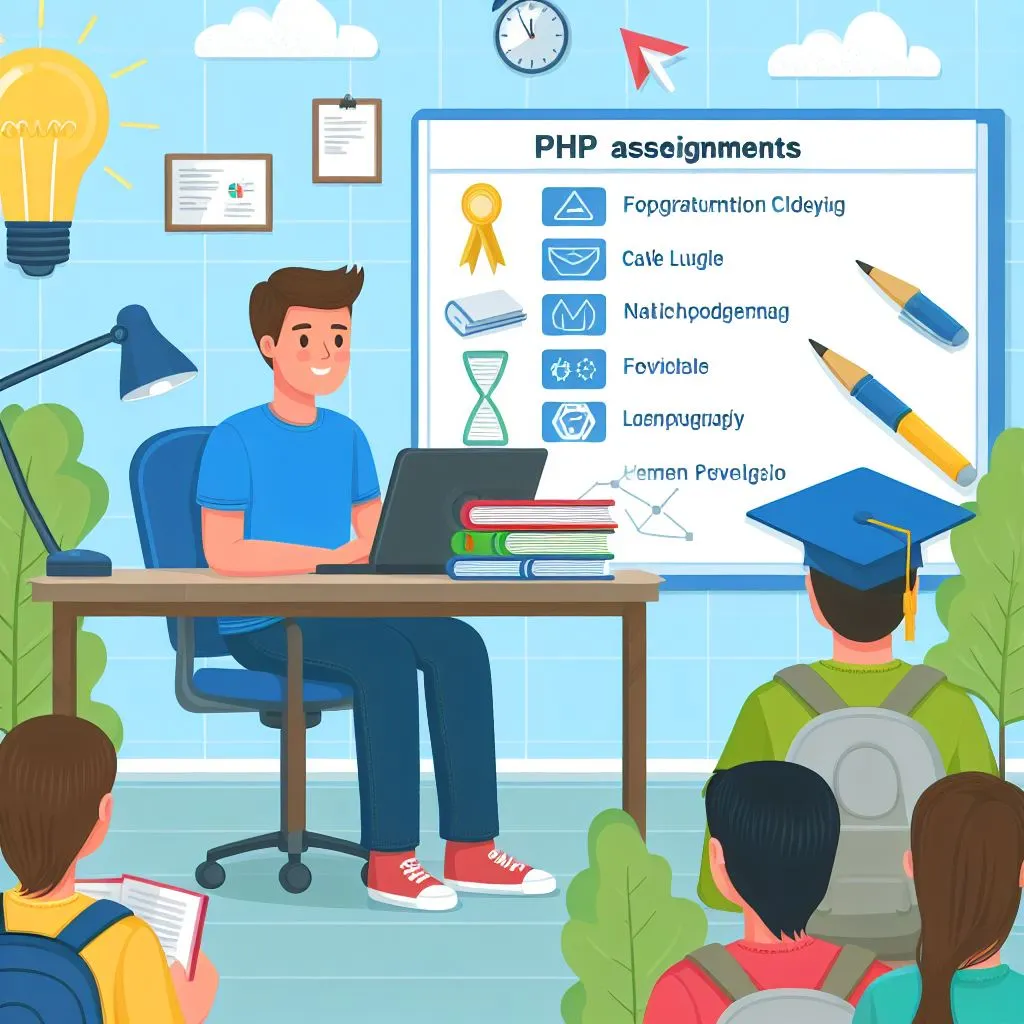Navigating PHP Assignments: Expert Strategies for Success

In the dynamic landscape of web development, PHP (Hypertext Preprocessor) stands as a foundational cornerstone, revered for its unparalleled flexibility, user-friendly nature, and robust community support. This versatile language has cemented its position as a go-to choice for developers across the globe, offering a potent blend of functionality and accessibility. However, harnessing the full potential of PHP demands more than mere acquaintance; it necessitates unwavering dedication, consistent practice, and a meticulously structured approach. Whether you're a novice embarking on the journey of mastering PHP's intricate syntax or a seasoned developer seeking to refine your skills and optimize complex assignments, this comprehensive guide serves as your roadmap. Designed to cater to individuals at varying proficiency levels, this resource delves deep into expert strategies, empowering you to navigate PHP's nuances with confidence and precision. By embracing these proven techniques and fostering a growth-oriented mindset, you can unlock new horizons in web development, leveraging PHP's capabilities to create innovative, efficient, and scalable solutions that resonate with modern digital landscapes. Whether you need assistance with your PHP assignment or aspire to enhance your proficiency in PHP development, this guide offers valuable insights and strategies to support your learning journey.
Understanding the Fundamentals

In the realm of PHP development, grasping the fundamentals serves as the cornerstone for building expertise and proficiency. This critical foundation encompasses a deep understanding of PHP syntax, structure, and server-side scripting mechanisms. By immersing yourself in these core concepts, you lay the groundwork for effective problem-solving, code optimization, and seamless execution of complex assignments. Furthermore, a comprehensive grasp of PHP's fundamental principles empowers you to navigate the intricacies of web development with confidence and precision. Embracing this foundational knowledge not only enhances your coding capabilities but also fosters a robust framework for continuous learning and growth. As you delve into the intricacies of PHP fundamentals, you cultivate a solid base upon which to build advanced skills, explore innovative techniques, and contribute meaningfully to dynamic development projects.
PHP Syntax and Structure
Before delving into intricate PHP assignments, acquiring a deep understanding of PHP syntax and structure is paramount. PHP's integration with HTML facilitates dynamic content creation, necessitating proficiency in variables, data types, operators, and pivotal control structures such as loops and conditional statements. Mastery of these foundational elements not only empowers you to craft robust, efficient code but also facilitates seamless collaboration with peers, enabling effective code review and debugging. Furthermore, embracing best practices in PHP syntax and structure fosters consistency across projects, enhances code readability, and accelerates development cycles. As you immerse yourself in this essential aspect of PHP development, prioritize continuous learning, exploration of advanced topics, and application of industry-standard conventions to elevate your coding prowess and contribute meaningfully to impactful web solutions.
Server-Side Scripting
PHP's role as a predominant server-side scripting language underscores its significance in facilitating efficient server-client interactions within web applications. Grasping the intricacies of this server-client relationship empowers developers to optimize communication protocols, enhance security measures, and streamline data transmission processes. Additionally, a comprehensive understanding of HTTP requests and responses fosters effective resource allocation, minimizes latency, and ensures consistent user experiences across diverse devices and platforms. By prioritizing server-side scripting proficiency, you position yourself to navigate evolving web development landscapes, embrace emerging technologies, and contribute to innovative, scalable projects that resonate with modern user expectations.
Effective Problem-Solving Techniques
Navigating the complexities of PHP assignments necessitates the application of effective problem-solving techniques tailored to address diverse challenges. This critical skill set empowers developers to dissect complex problems, formulate strategic solutions, and optimize code functionality. By honing your problem-solving abilities within the PHP ecosystem, you cultivate a proactive mindset geared towards identifying opportunities, mitigating risks, and streamlining development processes. Furthermore, mastering effective problem-solving techniques enhances your adaptability, resilience, and efficiency, enabling you to navigate evolving project requirements with confidence and precision. As you embrace these strategies, you foster a collaborative environment conducive to innovation, collaboration, and continuous improvement, positioning yourself to deliver high-quality solutions that resonate with modern web development standards.
Break Down Assignments into Manageable Tasks
Navigating complex PHP assignments necessitates a strategic approach that emphasizes breaking down multifaceted tasks into digestible components. This structured methodology encourages developers to prioritize objectives, allocate resources effectively, and establish clear milestones to track progress. By segmenting assignments into manageable tasks, you cultivate a systematic workflow that minimizes overwhelm, enhances team collaboration, and promotes iterative development cycles. Moreover, this approach facilitates proactive risk management, enabling you to anticipate challenges, allocate contingency plans, and pivot strategies as needed. Embracing this methodology fosters a collaborative development environment, empowers team members to leverage their strengths effectively, and ensures alignment with project timelines and objectives. As you refine your skills in task decomposition, prioritize continuous evaluation, feedback integration, and adaptation to evolving project requirements, fostering a dynamic, responsive development framework that maximizes efficiency and delivers exceptional results.
Utilize Pseudocode and Flowcharts
Harnessing pseudocode and flowcharts emerges as a pivotal strategy in the PHP development lifecycle, facilitating comprehensive planning, visualization, and optimization of complex solutions. Pseudocode serves as a versatile tool for outlining program functionality, enabling developers to articulate logic, identify potential challenges, and refine algorithms before diving into code implementation. Concurrently, flowcharts provide a graphical representation of control flow, illustrating the sequence of operations, decision points, and data transformations within the application architecture. By integrating these visual aids into your development process, you foster a collaborative environment conducive to clarity, consistency, and creativity. Furthermore, leveraging pseudocode and flowcharts promotes effective communication among team members, streamlines code review processes, and accelerates solution validation. As you immerse yourself in these visualization techniques, prioritize iterative refinement, stakeholder collaboration, and alignment with industry best practices to cultivate a development framework that prioritizes efficiency, innovation, and excellence.
Best Practices for Code Optimization
Code optimization stands as a pivotal aspect of PHP development, encompassing a range of best practices designed to enhance performance, maintainability, and scalability. This essential discipline encourages developers to refine their codebase, eliminate inefficiencies, and adhere to established coding standards. By prioritizing code optimization within your PHP projects, you foster a robust development environment characterized by efficiency, reliability, and adaptability. Furthermore, embracing best practices for code optimization empowers you to create streamlined solutions, minimize resource consumption, and optimize user experiences across diverse platforms. As you immerse yourself in the nuances of code optimization, you cultivate a disciplined approach to development, fostering a culture of excellence, innovation, and continuous improvement.
Maintain Code Readability and Consistency
Prioritizing code readability and consistency remains a foundational principle in PHP development, underpinning the creation of maintainable, scalable solutions. By adhering to established coding conventions—such as employing meaningful variable names, consistent indentation patterns, and comprehensive documentation—you cultivate a codebase that is accessible, understandable, and adaptable. This disciplined approach not only enhances individual productivity but also facilitates seamless collaboration among team members, enabling efficient code reviews, debugging, and feature implementation. Furthermore, maintaining consistency across projects fosters a unified coding style, streamlines knowledge transfer, and accelerates onboarding processes for new team members. As you prioritize readability and consistency, consider leveraging code analysis tools, conducting regular peer reviews, and adopting industry best practices to continually refine your coding standards, foster a collaborative development culture, and ensure long-term project sustainability.
Implement Error Handling and Validation
Incorporating robust error handling and validation mechanisms stands as a critical aspect of developing resilient PHP assignments, safeguarding against unforeseen issues and enhancing application reliability. Anticipating potential errors—ranging from invalid user inputs and database connection failures to runtime exceptions—enables you to implement proactive safeguards, mitigate risks, and deliver a seamless user experience. By leveraging built-in PHP functions like try-catch blocks, isset() checks, and regular expressions, you create a robust error-handling framework that identifies anomalies, logs relevant information, and communicates actionable insights to users and developers alike. Additionally, adopting a systematic approach to data validation—validating input parameters, sanitizing user inputs, and enforcing data integrity constraints—reduces vulnerabilities, minimizes security risks, and fosters trust among end-users. As you refine your error handling and validation strategies, prioritize proactive monitoring, continuous improvement, and adherence to industry standards to ensure optimal performance, security, and reliability across diverse PHP projects.
Leveraging Resources and Community Support
Harnessing resources and community support emerges as a cornerstone strategy in PHP development, fostering collaboration, knowledge sharing, and growth within the developer ecosystem. This pivotal approach encourages individuals to explore diverse resources, engage with like-minded professionals, and leverage collective expertise to overcome challenges and drive innovation. By tapping into the vast array of resources and community-driven platforms available, developers can access valuable insights, gain exposure to emerging trends, and cultivate meaningful connections with peers and industry leaders. Furthermore, embracing community support fosters a collaborative environment conducive to learning, mentorship, and professional development, enabling individuals to expand their skill sets, refine their techniques, and contribute to impactful projects within the dynamic realm of web development.
Explore Documentation and Online Resources
Delving into PHP's comprehensive documentation and online resources serves as an invaluable strategy for developers seeking to enhance their proficiency and stay abreast of industry trends. The official PHP manual stands as a cornerstone resource, offering exhaustive insights into language constructs, functions, and best practices that foster code quality, performance optimization, and scalability. Furthermore, community-driven platforms like Stack Overflow provide a collaborative environment where developers can pose queries, share innovative solutions, and engage in meaningful discourse with industry peers. By leveraging these resources, you cultivate a knowledge-rich ecosystem that encourages continuous learning, fosters mentorship, and facilitates the exchange of diverse perspectives. Additionally, actively participating in online forums, subscribing to reputable blogs, and attending virtual conferences enable you to expand your network, gain exposure to emerging technologies, and contribute to vibrant developer communities that drive innovation and excellence within the PHP landscape.
Engage in Continuous Learning
Embracing a culture of continuous learning remains pivotal in navigating the ever-evolving landscape of web development and harnessing PHP's full potential. The rapid proliferation of new techniques, tools, and trends necessitates a proactive approach to skill enhancement, adaptation, and innovation. By immersing yourself in advanced PHP topics, attending industry-specific workshops, and experimenting with cutting-edge technologies, you cultivate a growth-oriented mindset that prioritizes adaptability, resilience, and creativity. Furthermore, fostering a curiosity-driven approach encourages exploration of emerging paradigms, methodologies, and best practices, positioning you to leverage PHP's capabilities effectively, deliver innovative solutions, and address complex challenges with confidence. As you embrace continuous learning, prioritize collaboration, knowledge sharing, and mentorship, you foster a dynamic professional development framework that empowers you to navigate PHP assignments proficiently, contribute to impactful projects, and achieve sustained success in the competitive web development landscape.
Conclusion
Successfully navigating PHP assignments demands a structured methodology, adept problem-solving skills, and an unwavering dedication to ongoing education. By mastering the foundational principles of PHP, adhering to best practices in code optimization, and harnessing the plethora of resources at your disposal, you empower yourself to adeptly handle intricate PHP tasks. This proactive approach not only enhances your proficiency but also positions you to make meaningful contributions to significant web development initiatives. As you integrate these expert strategies into your workflow, it's essential to foster a growth-oriented mindset, recognizing each assignment as an opportunity for learning and refinement. Embracing this perspective enables you to overcome challenges, adapt to evolving industry trends, and continually elevate your PHP expertise. Ultimately, by embracing these principles and committing to excellence, you embark on a fulfilling journey toward mastering PHP, enriching your skill set, and making a lasting impact in the dynamic realm of web development.